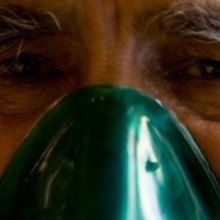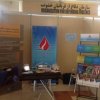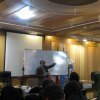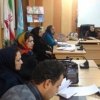
Iran's chemical weapon survivors show twin horrors of WMD and sanctions
Iran's chemical weapon survivors show twin...
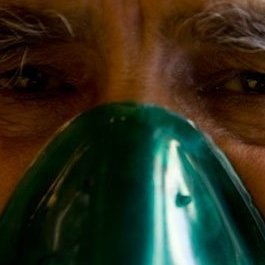 "I'm optimistic this time," he said to me. His young sons looked on as their 43-year-old father talked. His wife nervously picked at her nails, with the expression of someone willing herself to share a loved one's hope.
"I'm optimistic this time," he said to me. His young sons looked on as their 43-year-old father talked. His wife nervously picked at her nails, with the expression of someone willing herself to share a loved one's hope.
"The last time I was in the hospital, I was lucky because the man who shared the room with me is a flight attendant who travels internationally. He said he will buy the medicine I need post-surgery on his travels to Switzerland."
Ahmad needs a year's worth of medicine to help ensure that his body will not reject the transplant again. His new friend has promised to bring back three months' worth each time he returns from Europe. Without this connection, it is a virtually sure thing that Ahmad will go blind.
Ahmad, a survivor of chemical warfare during the Iran–Iraq war of 1980-88, has already had more than 50 operations on his eyes. He uses multiple inhalers every day to alleviate the pain from his lungs, 60% of which were burned, and he takes a multitude of pills just to stay alive.
His story, which exemplifies the consequences of warfare conducted with weapons of mass destruction, is complicated by the fact that western sanctions against Iran have added an additional layer to the suffering: the shortage of medicine.
Doctors Matthias Jochheim of Germany and Gunnar Westberg of Sweden decided to take action to get vital medicines into Iran after they saw first-hand how the sanctions regime was causing critical pharmaceutical shortages in the country. Jochheim and Westberg visited Iran in November 2012 as part of a delegation from International Physicians for the Prevention of Nuclear War (IPPNW), which met doctors and medical students, and visited hospitals.
This summer, the Swedish and German branches of IPPNW announced that they would donate €4,000 (£3,400) worth of inhalers to Iran for patients suffering from severe lung damage due to mustard gas exposure in the 1980s. Jochheim, the former head of the German branch of IPPNW, said: "This action is not meant as a merely humanitarian action, but as a political demonstration against the consequences of the sanctions concerning war victims in Iran."
Westberg, a professor of medicine at the University of Goteborg, and IPPNW co-president from 2004 to 2008, said: "The lack of vital medicines in Iran is endangering the health and even survival of many Iranians today.
"Our action wants to make this situation known to the public and to politicians. We expect the political leaders, both in the countries that have introduced the sanctions and in Iran, to take steps immediately to solve the problems of import of medicines and medical products to Iran."
It is estimated that more than 100,000 survivors of chemical warfare live in Iran, more than any other country. Starting in 1981, Iraq fired countless chemical warheads at Iranian soldiers and civilians. Iraqi troops carried out the first extensive chemical attack on Iran in October 1983, with shells containing tons of sulphur mustard and nerve agents. Later, with the help of West Germany, Iraq began to manufacture mustard gas and nerve agents in large amounts.
There were more than 30 chemical attacks on residential areas in Iran, as well as on the Iraqi Kurdish town of Halabja, where more than 5,000 civilians were killed. Companies based in the UK, France, Germany, Spain, the US, India and Egypt were involved in selling and providing material for these chemical weapons to Iraq.
"I remember demonstrating in the 1980s against the fact that Germany was sending chemical agents to Iraq to be used in the war against Iran," says Jochheim. In an odd twist of fate, he sees his country now engaged in a different type of aggression against Iran that is harming the very people who bore the brunt of the chemical weapons.
Though the German and Swedish branches of IPPNW have publicly contacted their respective foreign ministries and asked that steps be taken to alleviate the medicine shortage, the physicians are not hopeful that things will change any time soon.
In theory, medicine is exempt from western sanctions against Iran; in practice, however, with blanket international sanctions on Iranian banking and shipping, it is extremely difficult for any pharmaceutical company to arrange for payment and shipment. Iranian government mismanagement and corruption have only exacerbated the problem.
Ahmad was lucky to befriend someone in a position to help him procure the medicine he requires; others with similarly pressing needs, from survivors of chemical warfare to those suffering from cancer, have very little hope.
Hamid, a veteran whose eyes were burned by mustard gas in 1986, was recently admitted to Labbafinejad hospital in Tehran to undergo corneal transplant and stem cell surgery. Like Ahmad, it is vital for him to take immunosuppressive medicine after the operation, or else his body will reject the transplant and he will go blind again. Hamid says he has been able to find just a few of the precious pills on the black market. They seem to no longer be available in pharmacies anywhere in Iran.
As for the IPPNW doctors, they spent two months searching for a European pharmaceutical company willing to ship the inhalers. Medeor, a German company, expressed its readiness to help, but everything is stuck in a bureaucratic tangle due to the myriad obstacles that must be overcome to send anything to Iran. For now, those who need the inhalers must continue to wait as papers get pushed through various offices around Europe.
Source : guardian
 Reload
Reload